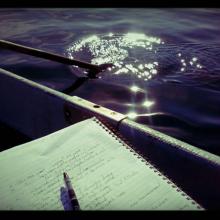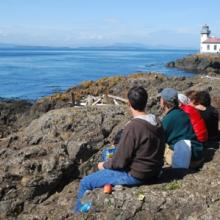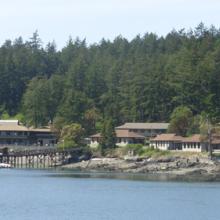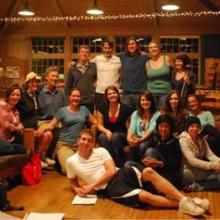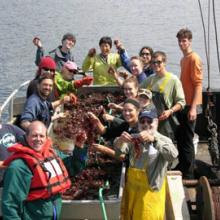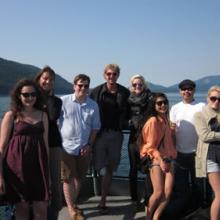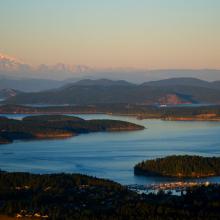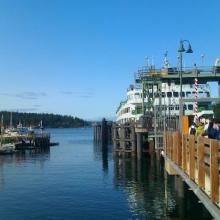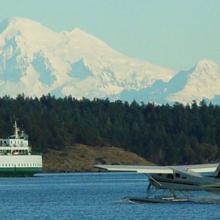Description
Information about the ENGL 581 Graduate Seminar in Friday Harbor
Study in the San Juans this Fall!
This fall, live by the sea and enroll in courses that explore the beautiful and varied marine environment at the University of Washington’s Friday Harbor campus. Read, write, and explore the sea and the seashore through literature, creative writing, marine biology, ocean, and fisheries courses (12-17 credits) that take full advantage of the San Juan Island setting. What better place to read works of sea-faring literature, or to take a marine biology course where you can actually interact with the marine life you are studying? Writers, artists, scientists, and researchers have long been drawn to the sea – come and experience it for yourself while earning UW credit!
The English courses, Reading and Writing the Marine Environment (ENGL 365, 5 credits-VLPA), and an optional Creative Writing Lab/Workshop (ENGL 493, 1-5 cr) will be taught by Professor Richard Kenney, UW English Department faculty, and Sierra Nelson, MFA alumna. Students who are interested in taking science courses or who need Natural World (NW) creditmay also wish to register for Introduction to Marine Biology, (FISH/BIOL/OCEAN 250, 5cr), which has no required pre-requisites and will be taught by Dr. Petra Ditsche, or Biology of Fishes (FHL 305, 5cr) taught by Dr. Adam Summers. (Other more advanced marine biology options are also available.)
An article about the Friday Harbor program was featured in the Spring 2012 issue of English Matters: "It’s not about the landscape, but it IS all about the landscape."
Find Poetry in Friday Harbor on Facebook
“Stand on that hill with the soft-swept grass and the dying climbing-tree. Shut your eyes harder, and revive the feelings: blooming camaraderie, hesitance forgotten by the unprompted bond that digs deeper than personal discrepancies, shadows pale in the face of that which drew us to the fire every night: an unspoken commonality, a shared spark.” -- Libby Hsu, past participant
"If you have any inclination to write, whether it be creatively or not, this program will definitely be worth your while. You're going to spend 3 life expanding months out in the San Juan Islands memorizing poetry, writing expressively, and spending quality time with students who share the drive to learn and to live boldly in their quest for meaning. But it's not just about writing, this course will push your mind to think in new and wondrous ways in which you may never have known were possible. It will make you so much more curious about what words mean and how words convey ideas and thus shape our entire human experience. I cannot recommend this course more if you are at a place in your life where you don't know quite where to go next." -- Kimber Loudon, past participant
Presentation about the Program (PDF)
Location: Friday Harbor Laboratories
THE FRIDAY HARBOR LABORATORIES (FHL) is the UW’s world renowned marine science research facility located on a 484-acre biological preserve on pristine San Juan Island, 75 miles northwest of Seattle, part of an archipelago that lies between the mainland and Vancouver Island. The islands of the San Juan Archipelago are generally rocky, forested, and rimmed by precipitous shores. Some are deeply cut by fjord-like inlets. The islands were strongly glaciated and have valleys with lakes, swamps, and bogs. The varied terrestrial and freshwater habitats offer a diverse flora and fauna.
Students live on-site in the FHL dorms for the whole quarter.
"A typical day is going to start off with breakfast in a wood lodge. Good food. Coffee, tea, hot cocoa always available as well as other beverages. It's really cozy and the environment is just breath-taking. You'll go to a few classes per day, interspersed with meals and games and poetry recitations at night around a campfire. Lots of free time too to explore, take the row boats to town for a brew or a movie..." --Kimber Loudon, past participant
Application Process
How to apply: Students should apply online, via the Friday Harbor Laboratories website.
Application Deadline: Priority admission: May 15, 2015. Standard application review date: July 1, 2015. Students are encouraged to apply as early as possible. Applications will be accepted after July 1 if space is available. For information please contact Stacy Markman, FHL Student Coordinator.
Required Documents:
- Web application form
- Course preference list
- Transcripts: Electronic submission strongly preferred. Send your UW transcript as an Adobe PDF document (.pdf) to Stacy Markman, Student Coordinator, Friday Harbor Laboratories, or fax it to: (206) 543-1273.
The Director of Friday Harbor Laboratories has final authority in accepting persons for the FHL instructional program. Humanities students enrolling in the Marine Biology Quarter are not required to submit letters of recommendation or a personal statement. Only the web application form and transcripts are required.
Courses
Suggested courses for English majors and other Humanities students:
Reading and Writing the Marine Environment (5 credits: ENGL 365 - VLPA, Optional W)
Faculty: UW Professor Richard Kenney; Sierra Nelson, MFA
Inspired by writers, artists, scientists and naturalists who have taken the sea for their subject, this is a marine-minded literature and writing course intended for readers and writers from all disciplinary backgrounds, engaging both creative and critical processes.
Q: What book is an unparalleled extravagance of literary ambition and style, a firsthand observatory of sea and life at sea, a serious natural history of cetacean mammals, an apparently bottomless mirror for American philosophical self-reflection, at once a mythic quest and a white-knuckle adventure story?
A: Moby Dick, our principal quarry. Chasing the White Whale, we’ll net other specimens from the literatures of the sea, contemporary and ancient, verse and prose. In all cases, this will be reading from a writerly perspective, considering the technical aspects of literary art, asking in a practical way how this work is done.
Q: Or, in a broader sense, how does a mind move from sea to seascape—from Nature to its representation—in any medium? Consider “the marine environment” in paint, verse, field note, and mathematics: do representations in each of these modes have anything in common? What are their various intents and purposes? How does nerve by language nudge the world and come away with an impression?
A: That’s the class. Our conversation will draw courage from large questions like these and others we may wish to bring to the table. Meanwhile, our principal considerations will be practical: reading for joy, conversing together, and testing our thoughts in an experimental spirit at the point of a pencil.
All welcome: no previous experience in creative writing or literary study is presumed. UW students earn “VLPA” credits in this course. Optional"W" Writing credit is available for ENGL 365 by request. Interested students should speak with the instructor on the first class day of the program.
(Note: this course fulfills requirements for the English major and the English minor; see an adviser for more information.)
Creative Writing Lab/Workshop (1 - 5 credits: English 493)
Faculty: UW Professor Richard Kenney; Sierra Nelson, MFA
Integrated with the literature class, this hands-on course further engages students through a series of generative creative writing experiments inspired by science and literature of the sea, as well as a dynamic roster of Visiting Artists and Scholars whose readings, lectures and prompts will focus our binoculars and microscopes more carefully on the language and skills of craft. Culminating in a portfolio of new creative writing and providing a more critical pressure toward revision than the parent class may permit, this course ignites new approaches to the creative process and develops conversational critical faculties in a communal setting. Previous creative writing experience is not required; curiosity and engagement is a requisite. (Note: this course fulfills requirements for the English major and the English minor; see an adviser for more information.)
photograph courtesy Kati Casto, past program participant
Marine Biology (5 credits: BIOL 250/OCEAN 250/FISH 250 - NW)
Faculty: Dr. Petra Ditsche
This 5-credit lecture/laboratory course focuses on the incredible diversity of organisms inhabiting the marine environment. During the quarter we will take a broad tour through the plants and animals of the marine realm (plankton, seaweeds, invertebrates, fish, birds, and mammals), exploring how these organisms have adapted to life under water. Numerous field and laboratory exercises will expose students to common marine biological techniques and to the diverse marine communities common to Washington’s San Juan Islands. (Note: this course fulfills a core requirement of the Marine Biology minor for University of Washington students.) Recommendation: at least one quarter of introductory biology (more is preferable). Enrollment limited to 30 students. For additional information contact: Dr. Petra Ditsche.
Biology of Fishes (5 credits: FHL 305 - NW, "W" Writing credits)
Faculty: Dr. Adam Summers
FHL 305 is an introductory course designed to provide an overview of the wonderful world of fishes, their kinds and ways. We’ll discuss and conduct a hands-on examination of the biology and diversity of living fishes of the world—from ancient bottom-living hagfishes and lampreys to modern-day sharks, rays, and bony fishes; from the freshwaters of Amazonia and to mangrove swamps and coral reefs; and from shallow-water lakes and streams to the deepest parts of the world's oceans. For additional information contact: Dr. Adam Summers
Other Science Course Options (prerequisites apply):
Integrative Oceans (4 credits: OCEAN 210 - NW)
Faculty: Dr Louise McGarry
We will learn about the processes that control the large scale surface and deep water circulation of the ocean. We will look at the distribution of temperature, salinity, and chemical tracers to detect the circulation pathway of currents in the deep sea. In the surface ocean, we will learn how the ocean responds to forcing from surface winds and how this response controls the pattern and speed of surface currents. Topics include temperature-salinity analysis; Coriolis force, geostrophic equilibrium, upwelling, water mass identification; water, salt, and heat budgets; advection and diffusion. Prerequisite: either Ocean 101, Ocean 200, or OCEAN 250/BIOL 250/FISH 250; recommended: either PHYS 114 or PHYS 121. The course is both quantitative and descriptive. Thus familiarity with basic concepts (e.g., units, forces, vectors,) covered in an introductory Physics class will help. Although the exams and problem sets are quantitative, the mathematical skill level is fairly basic. Basic familiarity with Excel, or a similar spreadsheet program, will be needed for some problem sets. Enrollment limited to 20 students. For additional information contact: Dr. Louise McGarry.
Research in Marine Biology (FHL 470, 6 credits, NW, "W" Writing credit)
Faculty: Dr Megan Dethier
This course provides students with a hands-on introduction of “doing science.” The bulk of the course will be spent engaged in research activities in close collaboration with a supervisor. Students’ projects will focus on selected questions of marine biology; research topics vary, but will involve lab experiments and/or field work in the local marine habitats of the San Juan Archipelago. We will also engage in lectures and class activities to gain skills in gathering, analyzing, and presenting data. Enrollment limited to 20 students. (Mary Gates funding may be available for UW-matriculated undergraduates. See the FHL website for details.) For additional information, contact Dr Megan Dethier.
"I am sure the feeling I had on returning from Friday Harbor is not an uncommon one. Really, it’s a two-step process.... The first step is longing: If I could live in a hut on an island and do nothing but write and talk about poems for the rest of my life, I would. The second is a romantic leap (lapse) of judgment: Well, why can’t I?” -- Emily Dhatt, past participant
Cost
The complete costs for a quarter at Friday Harbor are comparable to the costs for a quarter spent studying on the Seattle campus. Resident and Non-Resident tuition rates apply. (The UW has not yet established tuition rates for the 2015-16 academic year; please check back in July or August.)
Note: these costs are comprehensive: they include your room, three delicious meals per day plus snacks, tuition, materials, fees, and other expenses. Your only additional costs are your ferry ride out to the island and pocket money. Total costs are actually far less than the usual expenses associated with full time tuition and living in Seattle, on or off campus.
Resident, Matriculated UW Undergraduates:
Resident, matriculated students pay regular UW resident tuition, plus lab fees ($0-$215, depending on courses chosen), plus room and board ($2984 for FHL housing and three meals per day). Total costs will be regular tuition plus $2,984 - 3,199 in living expenses and fees.
Non-Resident Matriculated UW Undergraduates:
Non-resident, matriculated students pay regular UW non-resident tuition, plus lab fees ($0-$215, depending on courses chosen), plus room and board ($2984 for FHL housing and three meals per day). Total costs will be regular tuition plus $2,984 - 3,199 in living expenses and fees.
Non-Matriculated Students are also eligible to enroll in Friday Harbor courses. Please visit the FHL website for details.
*For more information about Friday Harbor costs and room and board information, please visit this page on the Friday Harbor Laboratories website.
Dates & Deadlines
Application Deadline: Priority admission: May 15, 2015. Standard application review date: July 1, 2015. Students are encouraged to apply as early as possible. Applications will be accepted after July 1 if space is available.
Travel
Frequently Asked Questions
What are the living accommodations like at Friday Harbor?
Students enrolled in FHL courses stay in dormitories or huts (mini cabins), generally in double occupancy rooms. The dining hall serves three delicious meals a day, which are included in your room & board. There are coin-operated laundry facilities, and there is a library (part of the UW Libraries system). There are common-use computer and e-mail facilities in the computing lab, library, and lecture hall, and all buildings, including housing units, have UW wireless internet. More information about the facilities and resources can be found here.
On the UW Seattle campus, I live/plan to live in the dorms. Will I still be able to get a Seattle campus dorm room for winter and spring quarters if I don't live there in the fall?
Yes! In fact, it is easier to reserve a Seattle campus dorm room for winter quarter than it is for autumn. Autumn quarter generally has a waiting list, whereas there are no waiting lists for winter or spring. For more information, contact UW Housing and Food Services.
Can I use my UW Financial Aid to pay for the program? Are there scholarships available?
Yes, all UW financial aid applies to this program. There are some scholarships available; most are science-related, but you do not necessarily have to be an advanced science student. Students participating in the research courses can sometimes obtain funding through a Mary Gates Research Grant. Students from other universities may apply for limited financial aid from Friday Harbor Laboratories.Remember: your program costs cover everything: all tuition, all fees, all living expenses (lodging and meals), and program supplies. You will need to cover no more than your own pocket money and your ferry fare to Friday Harbor.
Do I need to be knowledgeable about science?
Definitely not: several of the marine biology courses are designed for beginners and have no prerequisites or expected background. Courses at FHL are very hands-on, so come prepared to learn on boats and at the beach as well as classroom settings.
Do I need to be an experienced creative writer or literary-studies type?
Not at all. Beginners in writing and literary studies are welcomed, and no prior experience is expected.
What kinds of free-time activities are available at Friday Harbor?
This beautiful island setting has a plethora of nature-related, historical, and sightseeing activities available. For a short list, see FridayHarbor.com.
